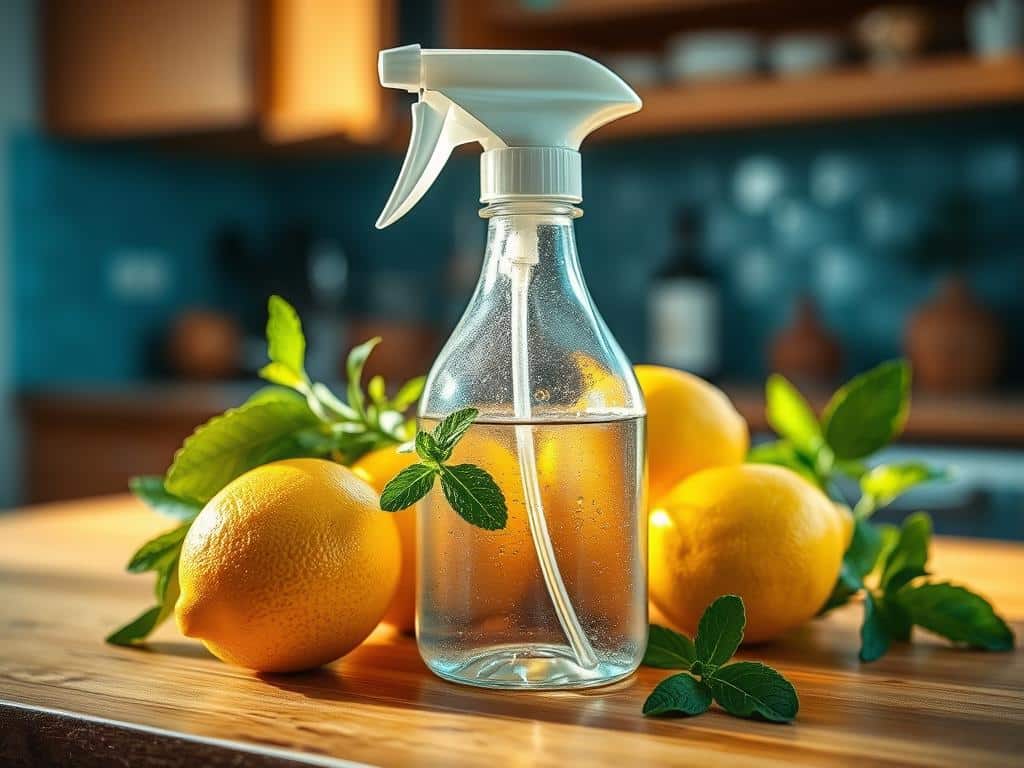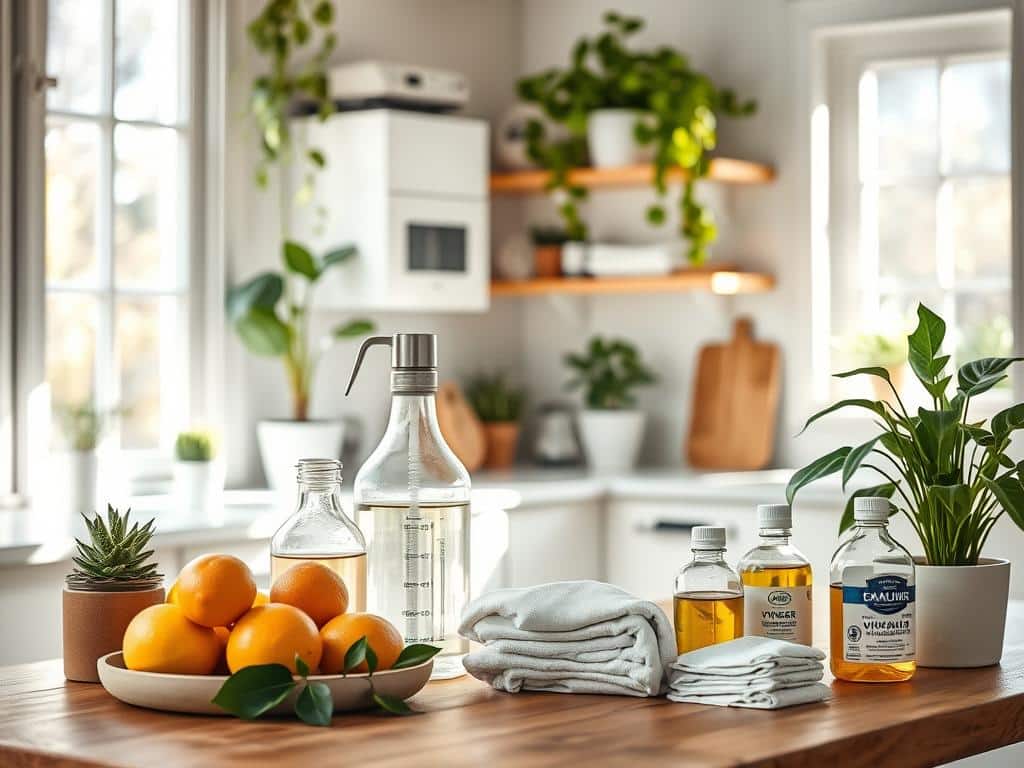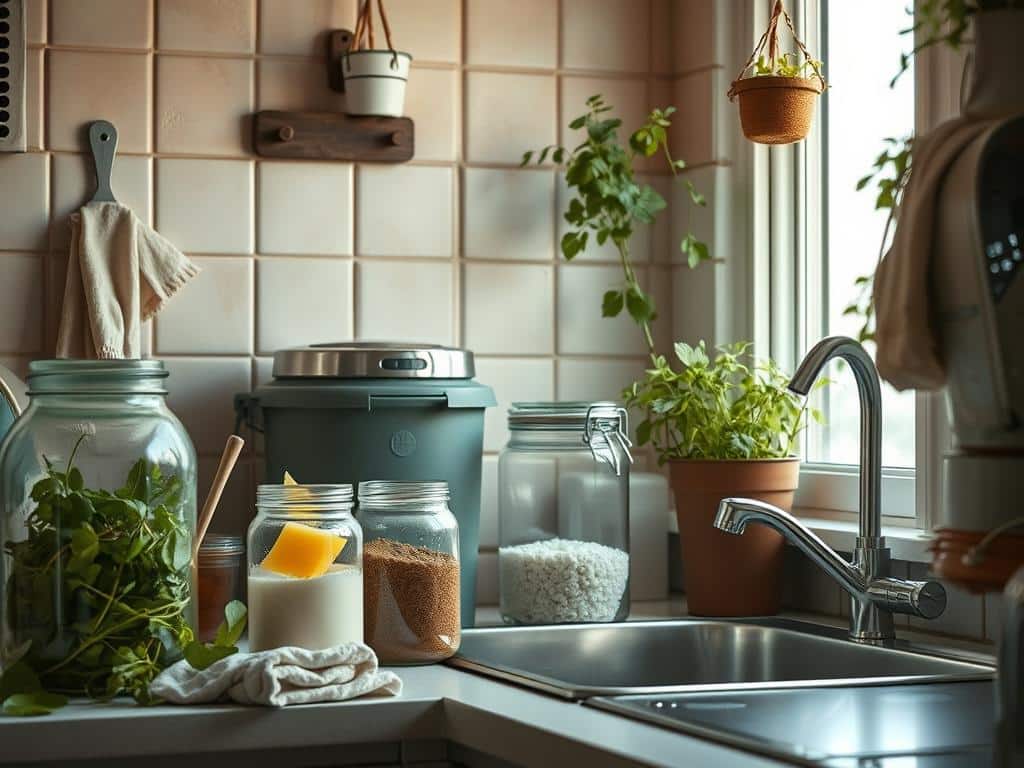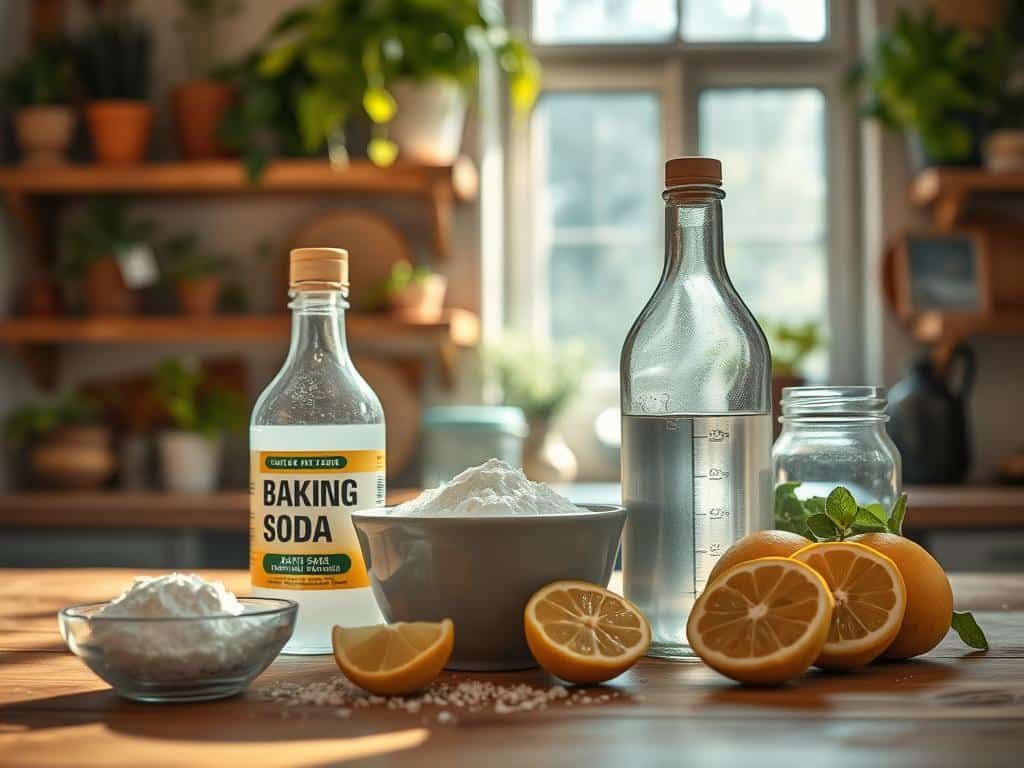
Making your own window cleaner is getting a lot of fans. It’s cheaper and greener than what you buy. With simple ingredients like vinegar and water, you can whip up a safe cleaner. You can even add essential oils for a nice scent.
DIY glass cleaner costs way less than the store-bought kind. You’ll spend about $0.12 to make a bottle versus $3.00 to buy one. Plus, you make more cleaning solution at home, offering better value and cleanliness.
It only takes five minutes to make this affordable cleaner. It guarantees a perfect shine on your glass without streaks. This guide will show you how to mix up a safe and effective glass cleaner. Your windows and mirrors will look amazing.
Why Choose Homemade Glass Cleaner?
Choosing a homemade glass cleaner offers big savings and benefits. Making it costs about $0.30 a bottle, while store-bought ones can be at least $3.50. This means you save money and keep your windows clean.
Going homemade is also better for the environment. You use natural ingredients like vinegar, avoiding harmful chemicals. This keeps your home safer and supports a trend towards safer cleaners. Many store-bought cleaners have strong chemicals that can be harmful. But homemade ones are made from safe, non-toxic ingredients.
Homemade glass cleaners are cheap and work well on many surfaces. A mix of vinegar, distilled water, and essential oil can clean windows, mirrors, and even stainless steel. It supports a green lifestyle and encourages safer cleaning habits.
Many families now prefer homemade cleaning solutions because they are safe, effective, and affordable. You can also check out other eco-friendly cleaning methods to help the environment even more.
People really like homemade glass cleaners, giving them an average rating of 4.25 out of 5. It shows they work well and are a safer choice for cleaning. Whether using newspaper or a cloth, choosing homemade is smart and effective.
Labeling your homemade cleaner bottles helps you use them while they are still effective. Making your own cleaner saves money and is part of a healthier, eco-friendly cleaning method. It’s all about putting your and your family’s health first.
Essential Ingredients for Homemade Glass Cleaner
Want streak-free windows with natural ingredients? A homemade glass cleaner is your best bet. Let’s explore the key components. They make the cleaner effective and eco-friendly.
The Power of Vinegar
Distilled white vinegar is a powerful cleaner. Its acetic acid cuts through dirt for a shiny finish. It’s cost-effective and cleans well. Just mix it with water for a great glass cleaner.
Using Distilled Water
Tap water might leave marks on your windows. Distilled water doesn’t have these minerals, so it’s better for your cleaner. It keeps your cleaner effective by avoiding contaminants.
Optional Ingredients
Want to enhance your cleaner? Add some optional ingredients. Isopropyl alcohol or vodka speeds up drying. Essential oils add a nice smell and extra cleaning power. Lemon oil, for instance, fights germs.
- 3 tablespoons distilled white vinegar
- 3 tablespoons rubbing alcohol
- 1/2 cup distilled water
- 10 drops of lemon essential oil
Mix these ingredients in under 5 minutes for a powerful cleaner. Use a 16 oz spray bottle for correct mixture ratios. For best results, apply with a microfiber cloth. This method gives you clean windows without streaks.
Step-by-Step Guide to Making Homemade Glass Cleaner
Making a homemade glass cleaner is easy and saves money. Here’s how to create your own vinegar-based cleaner with simple ingredients. Follow these steps and soon, your windows and mirrors will shine.
- Gather Your Ingredients: You need 1/2 cup of rubbing alcohol, 1/2 cup of white vinegar, 2 drops of dish soap, 2 cups of hot water, and 5-10 drops of essential oils (optional for a nice smell).
- Combine the Ingredients: Put the rubbing alcohol, white vinegar, and hot water in a spray bottle. Then add the dish soap and essential oils, if you want.
- Label Your Bottle: Write the date you made it on the bottle. This helps you remember to use it while it’s fresh. Most homemade cleaners should be used within a few months.
- Shake Well Before Use: Always mix the solution well before cleaning.
This homemade cleaner recipe is a smart choice for saving money and avoiding harsh chemicals. Store cleaners cost about $6 a bottle and have chemicals like ammonia. But, you can make your cleaner for under $2 with natural items.
Homemade glass cleaner also reduces waste and is better for the planet. You can make it smell nice with essential oils like lavender. These DIY cleaning products not only clean your glass without streaks but also make your home healthier.
How to Use Your Homemade Glass Cleaner
Cleaning with homemade products can be as good as store-bought ones. But, you have to know how to use them right. Follow these easy steps to get clear mirrors and glass.
First, you need to mix your cleaner well by shaking it. This makes sure all parts – like vinegar, lemon, or oils – mix well. It makes your natural cleaner work better.
Now, put a lot of cleaner on the glass surface. You can spray it directly on windows, mirrors, or glass tables. If there are hard spots, let the cleaner sit for a bit to loosen dirt and grease.
Then, wipe the glass with a microfiber cloth, coffee filter, or newspaper. These materials won’t leave streaks and will give you clear mirrors. Don’t use paper towels; they leave lint.
To avoid streaks, wipe in circles or vertical lines. This helps spread the cleaner well and picks up dirt better. If streaks do show up, use a dry part of your cloth to buff them away.
Be careful if you’re using vinegar solutions on delicate surfaces like marble or granite. Vinegar’s acid can harm these materials. If needed, choose a cleaner with rubbing alcohol instead.
Also, taking care of your homemade cleaner is key. Keep it in a spot that’s cool and dry. And keep it away from kids and pets to keep them safe.
| Procedure | Tools | Notes |
|---|---|---|
| Shake the cleaner well | Glass cleaner | Ensures even distribution of ingredients |
| Spray on glass surface | Spray bottle | Let it sit for tough spots |
| Wipe with microfiber cloth | Microfiber cloth, coffee filter, or newspaper | Avoid paper towels |
| Buff out remaining streaks | Dry section of cloth | Use circular or vertical strokes |
| Store properly | N/A | Keep out of reach of children |
Tips for Achieving Streak-Free Glass
Cleaning glass without streaks can sometimes be hard. But, if you get the hang of it, you’ll be cleaning like a pro. It’s all about the way you clean and how you keep your homemade cleaner in good shape. You might use a mix of water and vinegar or add essential oils to smell nice. Either way, being consistent is the way to get windows that shine.
Cleaning Techniques
How you clean can really change how your windows look in the end. A clean microfiber cloth is best for soaking up the cleaner and dirt. This leaves your glass looking smooth without any lint, unlike rags or paper towels.
Try wiping the glass side-to-side rather than in circles. Moving in circles can make static that pulls dust to the glass. You could also use a soft brush or newspaper with your cleaning mix. Doing this makes sure you’re cleaning without leaving any streaks.
If you still see streaks, clean the area again. This means there might be more dirt or residue that needs to go. Check out these streak-free glass tips for more advice on how to get better at it.
Maintaining Your Cleaner
Keeping your homemade cleaner in great condition is important for clean glass. Make sure to label and date it so it stays good to use. Shake it well before each use to mix everything up for the best results.
Use filtered or distilled water to keep your cleaner working longer and avoid streaks. If you need more cleaner, just increase the ingredients equally. A spray bottle is handier than a bucket, especially when you have lots of windows.
For safety, try using an extension pole instead of a ladder. Always rinse well with water if you’re cleaning outside to keep the glass clear. Homemade cleaners without soap or dyes are the best for no streaks. With these tips, you’ll have perfectly clean windows easily.
Advantages of Homemade Glass Cleaner
Making your own glass cleaner has many perks, including clean, streak-free windows. One key benefit is saving money. By using simple ingredients like vinegar and water, you can make an effective cleaner cheaply, avoiding the high costs of store-bought products.
Another big plus is ensuring healthier cleaning. Store cleaners often have harsh chemicals like ammonia. These can be bad for your health and the planet. By making your cleaner, you avoid these nasty substances. This makes it safer for homes with kids and pets. You get to control what goes into your cleaner, making it better for the environment and family safety.

People who care about the environment will love homemade glass cleaner. It cuts down on the need for packaged products. Making your own cleaner reduces waste from producing and throwing away commercial cleaner bottles.
| Advantages | Details |
|---|---|
| Cost-effectiveness | Homemade cleaners are significantly cheaper to make with basic ingredients like vinegar and water. |
| Healthier Options | Free of harsh chemicals such as ammonia, making them safer for use around children and pets. |
| Eco-friendly Practices | Reduces dependency on packaged commercial products, thereby minimizing environmental waste. |
| Customizable | You can add ingredients like essential oils for a pleasant scent and additional cleaning power. |
You can also make your glass cleaner fit your needs. Adding essential oils can make your home smell fresh. Just mix distilled white vinegar, water, and a bit of dish soap. This creates a powerful solution for streak-free windows.
In all, the benefits of making your glass cleaner range from saving money to healthier cleaning. They are a smart choice for any home. They offer benefits for your wallet and health, and help the planet with greener cleaning practices.
Conclusion
In conclusion, making your own glass cleaners offers eco-friendly and DIY benefits. You can use simple items like white vinegar and distilled water. Adding essential oils is optional for a nice smell.
This method is not only cheap but it’s also good for the Earth. Creating a new mix every few months keeps it working well. This means you can have clean windows and mirrors all year. Plus, you can adjust the recipe to suit your needs or allergies.
Using your own glass cleaner recipes cuts down on harmful chemicals in your house. It encourages a move towards DIY solutions for a healthier living space. It also supports being kind to the environment. So, the next time your windows need a clean, try making your own cleaner. You’ll see all the great things it offers.
FAQ
What are the key ingredients for making a DIY glass cleaner?
Why use distilled water in my homemade glass cleaner?
Can I add food coloring to my homemade glass cleaner?
How do I use my homemade glass cleaner effectively?
Are homemade glass cleaners safe for all surfaces?
How cost-effective is making my own glass cleaner?
FAQ
What are the key ingredients for making a DIY glass cleaner?
The key to a good homemade glass cleaner is simple: distilled white vinegar and distilled water. You might add essential oils for a nice smell. Or, a bit of alcohol can boost its cleaning power.
Why use distilled water in my homemade glass cleaner?
Distilled water is best for your cleaner because it doesn’t have minerals. Minerals in tap water can streak or cloud your glass. With distilled water, you’ll get windows and mirrors that are clear and streak-free.
Can I add food coloring to my homemade glass cleaner?
For sure, you can put food coloring in your cleaner. It makes it look fun without changing its cleaning ability. This also makes it easy to tell your cleaners apart.
How do I use my homemade glass cleaner effectively?
For the best shine, spray it on the glass and then use a microfiber cloth or newspaper to wipe. This method will leave your glass looking clean without any streaks.
Are homemade glass cleaners safe for all surfaces?
These cleaners are generally safe for glass but be careful with sensitive materials like marble. The vinegar may be too strong for some surfaces and could cause damage.
How cost-effective is making my own glass cleaner?
DIY glass cleaners are super affordable, costing about
FAQ
What are the key ingredients for making a DIY glass cleaner?
The key to a good homemade glass cleaner is simple: distilled white vinegar and distilled water. You might add essential oils for a nice smell. Or, a bit of alcohol can boost its cleaning power.
Why use distilled water in my homemade glass cleaner?
Distilled water is best for your cleaner because it doesn’t have minerals. Minerals in tap water can streak or cloud your glass. With distilled water, you’ll get windows and mirrors that are clear and streak-free.
Can I add food coloring to my homemade glass cleaner?
For sure, you can put food coloring in your cleaner. It makes it look fun without changing its cleaning ability. This also makes it easy to tell your cleaners apart.
How do I use my homemade glass cleaner effectively?
For the best shine, spray it on the glass and then use a microfiber cloth or newspaper to wipe. This method will leave your glass looking clean without any streaks.
Are homemade glass cleaners safe for all surfaces?
These cleaners are generally safe for glass but be careful with sensitive materials like marble. The vinegar may be too strong for some surfaces and could cause damage.
How cost-effective is making my own glass cleaner?
DIY glass cleaners are super affordable, costing about $0.30 for each bottle. This is a big save compared to store-bought glass cleaners.
What are the environmental benefits of using a homemade glass cleaner?
Using your own cleaners means less plastic waste and fewer harsh chemicals. This choice is better for our planet, making cleaning solutions eco-friendly.
How should I store my homemade glass cleaner?
Keep your cleaner in a spray bottle with a label. Shake it before use to mix well. Labels help remember what’s in it and when you made it.
Can I use my homemade glass cleaner on car windows?
Yes, it’s safe and effective for cleaning car windows. It cleans well without leaving streaks and avoids harsh chemicals.
What are the potential health benefits of using a non-toxic homemade glass cleaner?
With homemade cleaners, you avoid harsh chemicals. This makes your home safer for kids and pets. It’s a healthier choice for everyone.
Can I customize the scent of my homemade glass cleaner?
Absolutely, add a few drops of essential oils to make your cleaner smell great. Try lavender, lemon, or eucalyptus for a fresh, clean scent.
.30 for each bottle. This is a big save compared to store-bought glass cleaners.
What are the environmental benefits of using a homemade glass cleaner?
Using your own cleaners means less plastic waste and fewer harsh chemicals. This choice is better for our planet, making cleaning solutions eco-friendly.
How should I store my homemade glass cleaner?
Keep your cleaner in a spray bottle with a label. Shake it before use to mix well. Labels help remember what’s in it and when you made it.
Can I use my homemade glass cleaner on car windows?
Yes, it’s safe and effective for cleaning car windows. It cleans well without leaving streaks and avoids harsh chemicals.
What are the potential health benefits of using a non-toxic homemade glass cleaner?
With homemade cleaners, you avoid harsh chemicals. This makes your home safer for kids and pets. It’s a healthier choice for everyone.
Can I customize the scent of my homemade glass cleaner?
Absolutely, add a few drops of essential oils to make your cleaner smell great. Try lavender, lemon, or eucalyptus for a fresh, clean scent.



